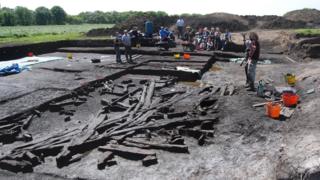
Image copyright
Star Carr Project
The archaeologist who helped lead the dig that found Britain’s oldest house said the site was still giving up its secrets 10 years on.
Star Carr hit the headlines in 2010 when a circular Stone Age structure found was dated to about 8,500 BC.
Archaeologist Nicky Milner said working on the site was akin to time-travel.
“It’s as close as you can get to being in a Tardis. It was an absolute dream, it took up 15 years of my life,” Dr Milner said.
Ray Mears, bushcraft expert and TV presenter, was one of those who helped unlock the purpose of wood found at the site.
Star Carr is a Mesolithic, or Middle Stone Age, site near Scarborough in North Yorkshire dating to almost 11,000 years ago.
The earliest British examples of jewellery, carpentry and a hunting bow were found there.
Dr Milner, the site’s co-director, was born within a few miles of the site but did not realise its significance until she later studied archaeology at university.
“I want to bring the site alive for everyone, I want to imagine what its inhabitants were like,” she said.
Image copyright
Star Carr Project
Image copyright
British Museum
Dr Milner, head of archaeology at York University, said it was an “amazing” day a decade ago when the world’s media visited but said “things that are that old are not very visual”.
“So it becomes more about the stories you can tell from what we are digging,” she said.
Other finds at Star Carr have included headdresses made from red deer skulls, thought to be used in rituals.
Image copyright
Star Carr Project
Image copyright
Yorkshire Museum
Excavation would only be a small part of an archaeologist’s work, with years of analysis to follow, said Dr Milner.
However, in the case of a “very, very rare” pendant marked with line, she said it was “the earliest artwork found but we will never know what the lines mean”.
With Mears’s help one piece of wood was recognised as Britain’s oldest complete bow.
“Ray was able to reconstruct the wood and make replica bows, he has worked with a lot of hunter gatherers and he’s got that kind of knowledge to get into the mind of hunters,” said Dr Milner.
One regret for Dr Milner is that Star Carr has not yielded “a single human bone” and only about 5% of the potential site has been dug, she estimated.
“We have only got a small piece of the picture, we are missing so much of the people’s lives, she added.
Image copyright
Star Carr Project
- The Yorkshire museum called Star Carr “the most significant Mesolithic site in Europe”
- The oldest remains of a house were found and up to three more have been excavated
- The house would have had a diameter of about 11ft (3.5m)
- John Moore, a local amateur archaeologist, carried out the first, small excavation at Star Carr in 1948
- The latest dig on the scheduled site started in 2004 and closed in 2015
- Other finds include long planks laid side by side at the edge of a former lake, the earliest carpentry known in Europe
- Dr Nicky Milner of the University of York, Dr Chantal Conneller of Newcastle University and Dr Barry Taylor of the University of Chester were the dig’s co-directors.
Source: BBC and Star Carr
Follow BBC Yorkshire on Facebook, Twitter and Instagram. Send your story ideas to [email protected] or send video here.
Read MoreFeedzy


